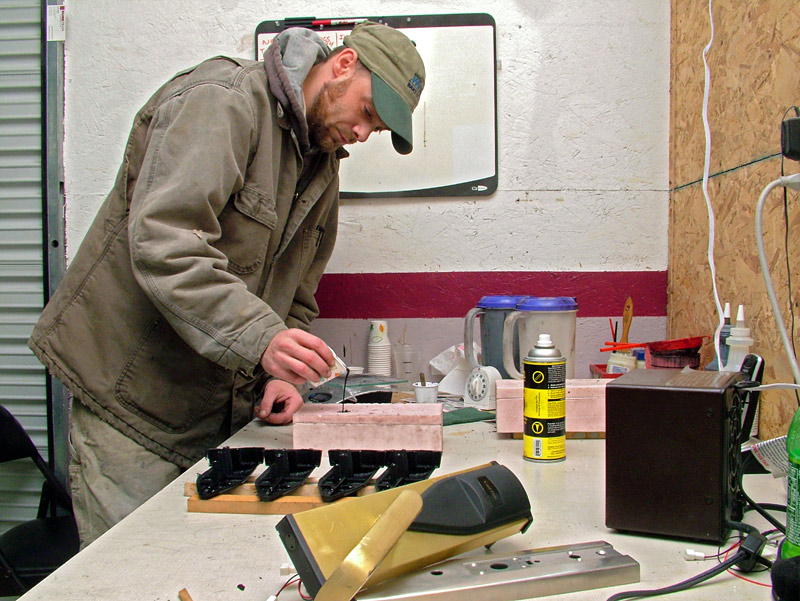Near misses, random hits and Battleship in the Far East
MORRILL - Two years ago, Russell Manton was on the verge of making the kind of business decision that might have earned him an invitation to a state functions as an example of Maine, or maybe American, ingenuity. So counter-intuitive and open to patriotic interpretation was it.
And it almost worked.
Manton’s office is in Morrill. The products he sells — electronic door locks and bedbug-blocking mattress covers (hotels account for the majority of his customers) — are made in factories in China, Pakistan and other countries with low-cost labor.
The outsourcing arrangement, typical of how many American businesses operate, was a money saver. But by 2010, the middle-of-the-night phone calls to suppliers on the other side of the globe, shipments relegated to the crawl of cargo ships, and quality control that diminished with every month that passed between visits to the factories had taken a toll.
"It's like playing a battleship," he said recently, describing how manufacturers in China would routinely offer a low price only to raise it abruptly after several orders. When this happened, he'd look elsewhere, all the time aware that it would probably happen again. "You're constantly moving around the board."
Manton did the math and decided it might pay off to open a sewing shop in the vacant storeroom next to his office, hire local workers, and make the mattress covers here in Maine.
The labor costs would be higher, but he would benefit from more control over all the other aspects of the business. He would also be able to label his products “Made in the USA,” which is where he thought he might get some support from Augusta.
"I was looking for some kind of corporate tax breaks for us to set up manufacturing here," he said.
It was a gubernatorial election year when he was making his plans, and Manton pinned his hopes on the new administration changing regulations in his favor. In the meantime, he cleared out the adjacent storeroom and marked the locations of sewing and ironing workstations on the floor in red and yellow tape.
Two years later, the tape was still on the floor, but the room had long since been reclaimed for storage.
"What we were hearing from the state was, 'We want manufacturing here but we're not going to do anything to encourage it,'" he said. Asked what would have made the difference, he offered the example of reduced tariffs for imports of raw materials, but said it could have been any number of things.
"We weren't getting the right answers to the questions we were asking so we didn't do it," he said.
Manton's product-specific businesses, Global Interiors and Sure Tech Industries, may not have been touched by the deus ex machina of government largesse, but each has benefited from another outside force: the media.
Manton had been selling mattress covers to hotels for close to ten years as a general precaution against allergens and pests when a few highly publicized bedbug infestations, including one in the Niketown store in Manhattan, vaulted the tenacious parasites into the national spotlight.
Bedbugs had always been around, but Manton said the media attention sent orders for Global Interiors' Sav-a-Bed mattress covers through the roof. The frenzy lasted long enough that bedbug-related precautions made it into the corporate policies of a number of hotel chains, so the number of orders remained high even after the hype died down.
Similarly, a television exposé on a flaw in the ubiquitous swipe-card locks used in hotels opened the door for Sure Tech to make retrofit inserts for reading radio-frequency (RFID) cards.
In a darker turn, Manton said Sure Tech has received inquiries from a dozen schools since the mass shooting at Sandy Hook Elementary School.
Most, he said, were looking for "panic button" systems that would allow a staff member to lock all the exterior doors of a school with the push of a button.
It wasn't bedbugs, but from a commercial perspective Manton said it has played out in a similar way. Namely, the issue has always around there to a certain degree, but a dramatic incident heightened awareness about it and created a market for solutions. Where security used to be a low-ranking item in school budgets, he said, it's now working its way closer to the top of the stack.
"And it's something we're going to be actively pursuing," he said.
For now, that means having most of his products manufactured overseas, which wasn't what was planning to do two years ago. But then some of his best business opportunities have been born of events he couldn't have foreseen.
"We've got to be flexible, and dare I say bend with the wind," he said.
Fortunately for Manton, his products are straightforward in a way that let them weather their 15 minutes of fame, and stay afloat through a dashed dream of bringing manufacturing back from overseas.
"We have a door lock, for goodness sake," he said. "We can aim that toward hospitality, corporate, schools. It's a door lock."
Contact Ethan Andrews by email at news@penbaypilot.com































